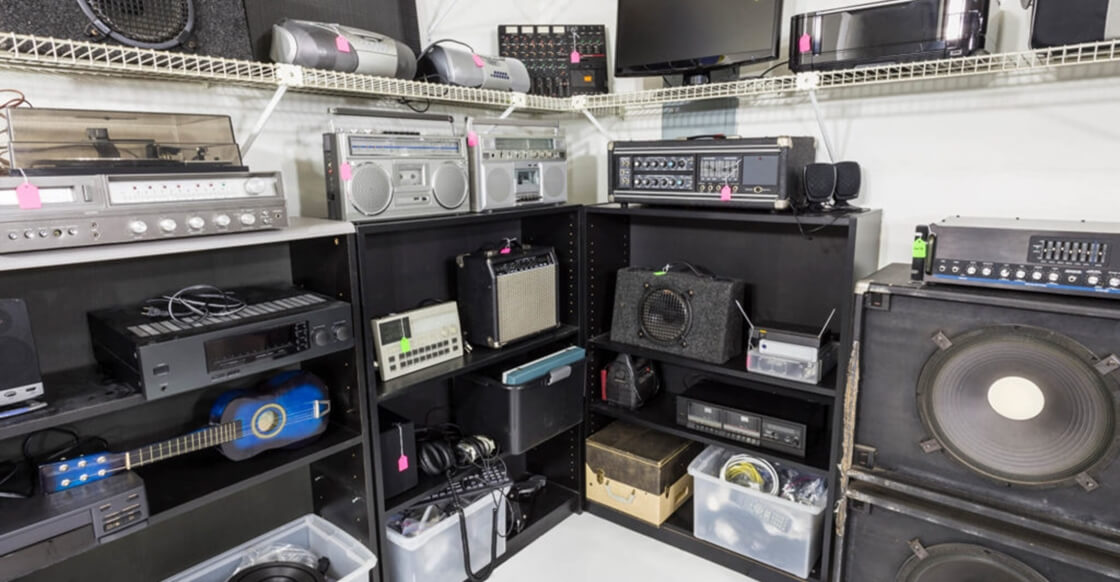Self-storage is an increasingly popular and versatile storage solution for both domestic and commercial purposes. One of the most commonly stored types of items is electrical equipment.
If you are storing electrical equipment for even short periods, it is always best to take a few precautions. Doing this makes sure it remains in perfect condition. In this guide, we share our top tips for safely storing electronic equipment in a self-storage unit.
Why proper storage of electrical equipment is important
Sensitive electrical equipment is prone to damage from elements like humidity and dust. It can also provide ideal conditions for pests to set up homes in. In everyday use, this isn’t a problem. The heat of the device when it is running, and internal fans can help keep your device free of this type of problem.
But when devices are switched off for long periods, the problems that such conditions can cause can quickly erode delicate circuitry and render expensive equipment worthless. Even in clean and dry self-storage units, the humidity present in the atmosphere can do untold damage.
This is why taking the proper precautions when placing electrical items in self-storage is essential.
Expert Tips for Preparing Electrical Items for Self-Storage
Now that we know why it is important to take proper care when storing electrical equipment, let’s look at some tips to help you store electrical items like a pro:
1. Whenever possible, remove the batteries
This is particularly relevant when considering older equipment that uses alkaline batteries. But it is also good practice to do this whenever batteries are easily removable.
The major problem that this address is battery leakage. When alkaline batteries leak, the substance that “oozes” is called potassium hydroxide. This can easily corrode and destroy delicate circuitry.
The problem isn’t so critical with modern lithium batteries. However, their performance can be depleted if they are not stored correctly. Most battery manufacturers recommend that batteries not in use should be stored with between 50 and 70% charge.
It is also important when storing lithium batteries to make sure they are stored somewhere dry and away from heat sources.
2. Take a backup of crucial data
This is always a sensible option no matter what the circumstances, and although the proper precautions should mean that your data is safe when you retrieve your items, data is irreplaceable should the worse happen. In the case of ultra-sensitive data, it is good practice to remove the data altogether before storage.
It is worth bearing in mind that storage mediums, like hard drives, memory cards, and USB thumb sticks, are amongst the most delicate of components.
3. Clean thoroughly before storing
Thoroughly cleaning your electrical equipment before storage will help to keep it in great condition during storage. However, remember not to go overboard with the water when cleaning!
Using a slightly damp cloth for larger surfaces and soft brushes for vents and switches, make sure that the equipment is free from dust and grime before it is stored.
It is also good practice to use compressed air to clear dust and debris from the internal hardware. Most electrical and hardware shops sell compressed air by the can.
4. Make sure to protect screens and monitors
Screens and monitors are prone to cracking and scratches with even the slightest contact. They are also susceptible to the effects of dampness and humidity.
Several solutions can help keep your screens safe during storage. One way is to cut a sheet of good quality cardboard to the correct size and tape it over the viewing surface of the monitor, then wrap the entirety in a cotton sheet.
Bubble wrap is another great option! But remember to leave some breathing space to let any trapped moisture get out.
Finally, there are purpose-built screen protectors available for many items. These are usually manufactured out of materials like tempered glass or plastics like PET.
5. Don’t skimp on the packaging materials
If you are using boxes or packing materials to protect your electrical items, then make sure they are of the correct quality. Using inferior boxes and tape can be a recipe for disaster, especially if you are stacking boxes.
Properly constructed boxes that are fit for purpose are always recommended, whatever you are storing. In the case of expensive electronics, this is even more relevant. At Belfast Self Storage, we stock the highest quality packing boxes and packing materials to make sure your goods are as protected as possible when in storage.
6. Pay attention to gaps and vents
Vents in electrical machinery play an important part in keeping your equipment cool when it is being used. But they can be something of an Achilles heel while in storage.
These can allow dust, dampness, and pests into the internal components and circuitry. These can easily be sealed with a cloth or archiving tape, even masking tape can do the job. Just make sure that the tape you use doesn’t leave a residue when it is removed, and preferably use tape that has breathable properties.
7. Don’t over-stack!
This is another tip that applies to self-storage as a whole but takes on a whole new importance when discussing valuable and sensitive electric equipment. Not only does stacking too high cause potential problems when storing and retrieving equipment, but stacks can also topple over, particularly if they are in long-term storage.
Additionally, the extra weight of a high stack can damage electric equipment located at the bottom of a stack.
Conclusion
By following a few simple rules and applying a little common sense, you can safely store electrical equipment for long periods and have it remain in perfect condition.
At Belfast Self Storage, we are here to help. If you have any questions about how to safely store electrical equipment, just contact us, and our storage experts will be able to offer all the advice you need.


